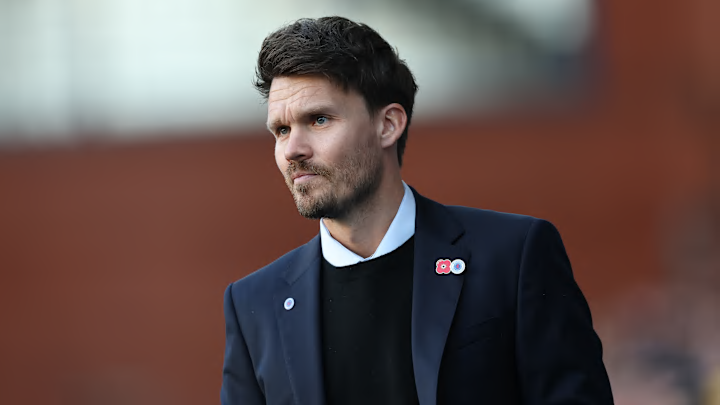Danny Röhl’s second Rangers win in four days felt less like a one-off result and more like the early outline of a plan.
The 1–0 victory over Hibernian at Easter Road was not perfect, nor was it dominant, but it was organised, purposeful and controlled in a way Rangers have not been domestically in a long time.
The headline moments were Danilo’s composed early finish from outside the area and Jack Butland’s heroic late penalty save, but the real story was in the structure: how Rangers played, how they adapted, and why certain players were trusted.
The shape
Röhl has shifted Rangers to a 3-4-1-2, but this is not a slow, possession-centred back three. It’s a shape built for:
• Covering long balls and runners in behind
• Winning second balls higher up the pitch
• Pressing with a coordinated front block
• Transitioning forward quickly rather than recycling endlessly
John Souttar sat central, acting as the organiser and is now able to step out with the ball without the worry of space in behind at a quick changeover in possession.
Nasser Djiga and Derek Cornelius play wider and more aggressive, stepping in front to win duels rather than waiting to defend territory.
That extra security behind the ball is deliberate, Röhl made clear he studied the league first:
Post-match he said: “You have always to cover long balls in behind.
“It’s good when you have plus one who can help.”
This is not aesthetic ideology. It’s practicality tailored to the Scottish Premiership’s chaos.
Wing backs with different roles
Jayden Meghoma and Max Aarons offered very different profiles:
• Meghoma: direct, overlapping, confrontational 1v1 runner.
• Aarons: recovery speed and defensively sound.
One stretched Hibs vertically. The other protected transitions. That balance mattered.
Chris Cadden could not cope with Meghoma early, got booked, and was hooked. That was a tactical win.
Meghoma was booked harshly early on, and with Hibs looking to get him sent off themselves – the boss smartly adjusted at half time and removed the on-loan Brentford full back despite his impact.
Midfield: Barron the anchor and Raskin the connector
Connor Barron and Nicolas Raskin were asked to cover huge distances, not to dictate slow tempo.
• Barron screened, pressed, fouled when required (smartly)
• Raskin carried and linked, keeping the game moving forward
Neither was asked to “run the game”. Both were asked to run for the team.
This is a shift away from slow control and toward functional control.
Moore as the missing “link player”
Mikey Moore played behind the strikers and was crucial to how Rangers broke pressure:
• Pressed centre-backs from inside angles.
• Dropped into pockets to break the first Hibs line.
• Carried the ball to initiate transitions and win tactical fouls.
His final ball let him down twice, but the role is clear: connect the phases, increase the tempo and drive Rangers up the park.
The front two: A system designed to utilize Danilo and help Chermiti
Danilo is not being asked to be a target man or a self-creator anymore, he is playing deeper, linking in behind Yousef Chermiti and finding space in the pockets.
• Chermiti occupied centre-halves physically, particularly Grant Hanley – whilst he was not successful every time, the Portuguese forward showed improvement.
• Danilo peeled off into half-spaces and struck early.
Two games. Two shots. Two goals.
Röhl called this job-sharing: “Everyone needs to feel the connection. We need more than 11 players.”
This is how you rebuild a striker’s confidence without forcing the issue.
Rotation Is Not a Risk - It’s a Requirement
Lyall Cameron being left out caused chatter. Röhl shut it down instantly when he said: “He’s fine. He’s available.” No drama. No fallout. Just horses for courses in his selection.
He rotated Meghoma, Djeidi Gassama, Thelo Aasgaard, Chermiti, Danilo and Moore across two matches. Not as experiments, but as planned role allocation based on the opposition and flow of the match.
This is the first time in months Rangers have looked like a squad, not just a team sheet hastily and randomly thrown together hoping that whatever is thrown at the wall sticks.
The mentality shift
The game wasn’t won with fluency, it was won with maturity.
• Rangers absorbed pressure when needed and “suffered” as the head coach suggested.
• They sprinted back instead of jogging.
• They celebrated blocks like goals.
• And most tellingly, they ran towards the away fans at full time.
Röhl said it plainly: “Maybe one week ago we were a little far away from each other.
“Now we come closer” and that is something that changes seasons.
What This Means for Celtic on Sunday
Rangers go into the semi-final not favoured despite Celtic’s managerial situation but now they have a platform to build on. It is not perfect, but it is a plan in action that is clear and growing under the new boss.
